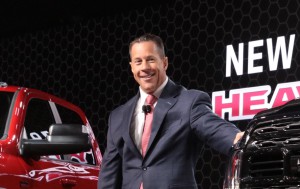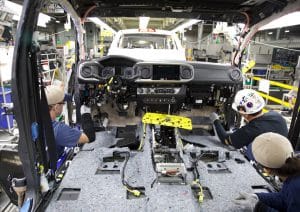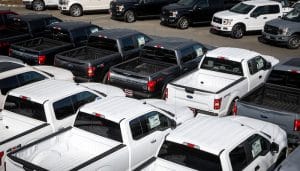
Reid Bigland, former FCA head of U.S. Sales, told analysts and journalists he expected a sales rebound in the second half of the year.
Credit federal aid, including extended unemployment benefits, with keeping the auto industry from crashing and burning during the coronavirus pandemic, Reid Bigland, the recently retired head of sales for Fiat Chrysler Automobiles, said during a webinar sponsored by the Society of Automotive Analysts.
Auto sales tumbled 39% in March, as the country entered a broad lockdown, many analysts expecting the numbers could collapse in April, J.D. Power forecasting a decline of as much as 80 percent. The final figures, a roughly 50% decline, were some of the worst seen in decades, but came as a relief, nonetheless, said Bigland. And demand sharply rebounding in May and June, instead of entering the “freefall” that might have happened without the government providing assistance in ways that didn’t happen during the Great Recession.
“Normally when you get an 80-year high in unemployment — 14.7% — you’re going to get devastation across the board,” Bigland told an online audience of automotive analysts and journalists. “You’re going to get repossessed cars. You’re going to get home foreclosures, people delinquent on their homes and their payments. You’re going to get borderline Armageddon. But it didn’t happen.”
(Bigland leaving executive posts at Fiat Chrysler.)
Some key elements of the government’s pandemic aid are set to wrap up at the end of July, notably the additional $600 in unemployment benefits millions of Americans have qualified for. Washington lawmakers are currently negotiating an extended aid package and after initial resistance, Republican lawmakers are backing away from an earlier position that it was time to let things end.
“I don’t think that’s in anybody’s cards. I don’t think that’s anybody’s calculus, especially going into an election year,” said Bigland, who left FCA after settling a dispute that saw him sue the carmaker about his pay.
That said, Bigland did stress his belief that there will need to be an end to the various stimulus packages that have added billions of dollars to the federal deficit. The question he posed is “Where is the end game,” in terms of dealing with the pandemic? Does the country re-enter lockdown or reach “the point where we’re going to have to live with this COVID among us?”
What has been unusual during this pandemic is turning to a bailou8t strategy that has, as Bigland put it, “left consumers relatively harmless” despite seeing tens of millions losing their jobs.
The auto industry, on the other hand, has been hammered by the pandemic, taking on tens of billions of dollars of debt, even as their North American factories were closed for two months. And, with the pandemic continuing to create havoc, many plants are still struggling to get back to normal operations.
“All OEMs took on water,” said Bigland, translating into serious hits to earnings for the first half of this year. But things could have been far worse had the automotive market not been so strong going into the pandemic – U.S. sales reaching 17.1 million in 2019, the industry’s sixth-best year ever.

U.S. vehicle sales have been hammered due to the coronavirus pandemic, but Bigland said the government’s assistance kept it from being worse.
(Fiat Chrysler paying $40M settlement to SEC for falsifying sales reports.)
Automakers will be “paying for the brutalization their balance sheets took,” said Bigland, but he credits the manufacturers for quickly “battening down the hatches” to prevent an even worse situation. As a result, he predicts the industry “should be posting relatively good earnings during the third and fourth quarter, as long as the consumer stays in the game.”
With unemployment still well into double digits, that may depend, for now, on continuing stimulus programs.
Eventually, Bigland added, Washington will have to reckon with the cost of the pandemic, and among the belt-tightening steps that may require, he would not be surprised if the federal tax incentives of up to $7,500 offered to EV buyers goes away.
That does pose concerns about the potential impact on sales of electrified vehicles, but Bigland questioned whether it will be as severe as many fear considering the bulk of sales in the EV market fall into luxury territory, above $50,000.
The number of electrified vehicles – including conventional and plug-in hybrids, as well as pure battery-electric vehicles – has mushroomed, noted the former FCA exec, from 17 to 88 during the past decade. And a tidal wave of BEVs, such as the Ford Mach-E, Volkswagen ID.4 and GMC Hummer, will be charging into showrooms in the coming months.
Right now, battery vehicles are a big money loser, with sales averaging barely 6,500 per model once Tesla is excluded. Anything selling at volumes less than 10,000, however, is “an absolutely unmitigated financial disaster,” said Bigland.
The challenge for automakers, said Bigland, will be to deliver the sort of products consumers will be willing to buy since various emissions regulations will require that anywhere from 30 to 40% of the vehicles sold in the U.S. by mid-decade will need to be electrified.
(Ram takes No. 2 spot in pickup sales from Chevy Silverado.)
The Tesla model, which builds on the premise of going “green,” adding performance, distinctive styling and other attractive features, likely will be the key to making EVs sell and, in turn, deliver the profits the industry needs, Bigland said.


